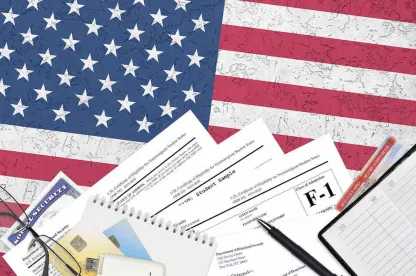Effective June 1, 2021, U.S. Citizenship and Immigration Services (USCIS) has expanded and extended ongoing flexibility for employers complying with certain I-9 employment eligibility verification requirements due to ongoing issues caused by the COVID-19 pandemic. Extended policies will remain valid through August 31, 2021.
Background
On March 19, 2020, U.S. Immigration and Customs Enforcement (ICE) announced that it would exercise prosecutorial discretion with regard to Form I-9 employment eligibility verification. A day later, ICE formalized this announcement through a policy allowing employers to review employment eligibility documents virtually or through an agent. According to ICE, the flexibility policy applies to workers operating in remote settings due to COVID-19–related precautions.
In a statement released in May 2021, ICE announced that workers hired on or after June 1, 2021, would be considered exempt from the physical inspection requirements until beginning nonremote employment on “a regular, consistent, or predictable basis.” (Emphasis added.) The policy does not apply to workers “physically present at a work location.” (Emphasis added.) These workers must complete in-person verification of identity and employment eligibility documentation for Form I-9 purposes.
Updated Form I-9 Receipt Policy
Since USCIS first introduced COVID-19–related interim flexibility policies, the agency has implemented several notable updates with respect to I-9 employment eligibility verification. Most recently, on June 25, 2021, USCIS announced an update to the “receipt rule,” whereby a worker presents evidence of having filed an application “to replace a List A, B, or C document that was lost[,] stolen or damaged.” Under the USCIS policy, the employee must return to the employer within 90 days to present proof the document was replaced. Recognizing that this may not always be possible due to processing delays or other factors, USCIS has updated and clarified the policy as follows:
If the employee does not present the original document for which the previously provided receipt was issued but presents, within the 90-day period, another acceptable document (or documents) to demonstrate his or her identity and/or employment authorization, employers may now accept such documentation.
USCIS further confirms that when an employee uses a document that differs from the document being replaced, “the employer should complete a new Section 2 and attach it to the original Form I-9” to complete employment eligibility verification processes.
This follows earlier USCIS policy updates to the so-called “receipt rule” issued on January 12, 2021, related to lawful permanent residents. USCIS guidance specifically confirmed that a receipt notice demonstrating timely application to replace or renew an expired permanent resident card (green card) would be sufficient proof of continued lawful permanent residence in the United States for 12 months, including for purposes of work and travel authorization. USCIS also confirmed that if a lawful permanent resident cannot show the original document, or if the document has expired more than 12 months before the filing of the application to renew it, the person will need to provide proof of lawful permanent resident status while waiting to receive the new Form I-551 permanent residence card in order to benefit from the updated policy.
What This Means for Employers
The above-referenced I-9 policy updates offer expansions and limitations for employers and employees alike. Since the inception of the COVID-19 pandemic, ICE’s flexibility guidelines have afforded employers far greater flexibility to work with their existing employees and new employees to verify (or reverify) their employment eligibility in the United States. In general, the flexibility guidelines permit employers to rely on scanned copies of documents for the purposes of facilitating employee recruitment, hiring, and onboarding in remote settings, despite circumstances that would otherwise present significant issues related to meeting traditional in-person I-9 employment eligibility verification requirements.
The long-term implications of these new policies remain unclear at present, particularly with respect to whether ICE’s flexibility stance on in-person requirements will persist beyond the pandemic and continue for employers that offer remote work full-time to their employees. While the language used by ICE in its various announcements indicates that in-person verification will ultimately be required, ICE’s willingness to remain flexible even as more employees return to in-office work schedules provides some level of hope that these policies may remain intact.
In addition, USCIS’s updated receipt rule allows for greater flexibility in terms of verifying worker employment eligibility. For lawful permanent residents, the expanded receipt rule allows for greater flexibility related to work and travel authorization while waiting for the issuance of a new Form I-551 permanent resident card. It further demonstrates the government’s understanding that processing times for these applications are quite slow and that exemptions need to be made for persons, who by no fault of their own, cannot show renewed documents.




 />i
/>i
